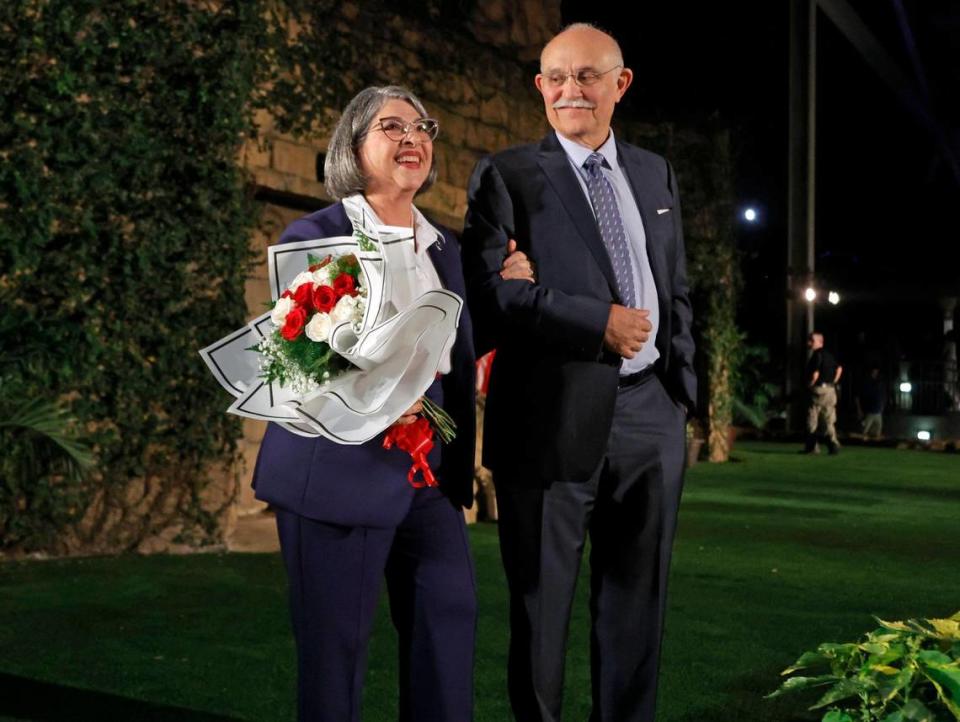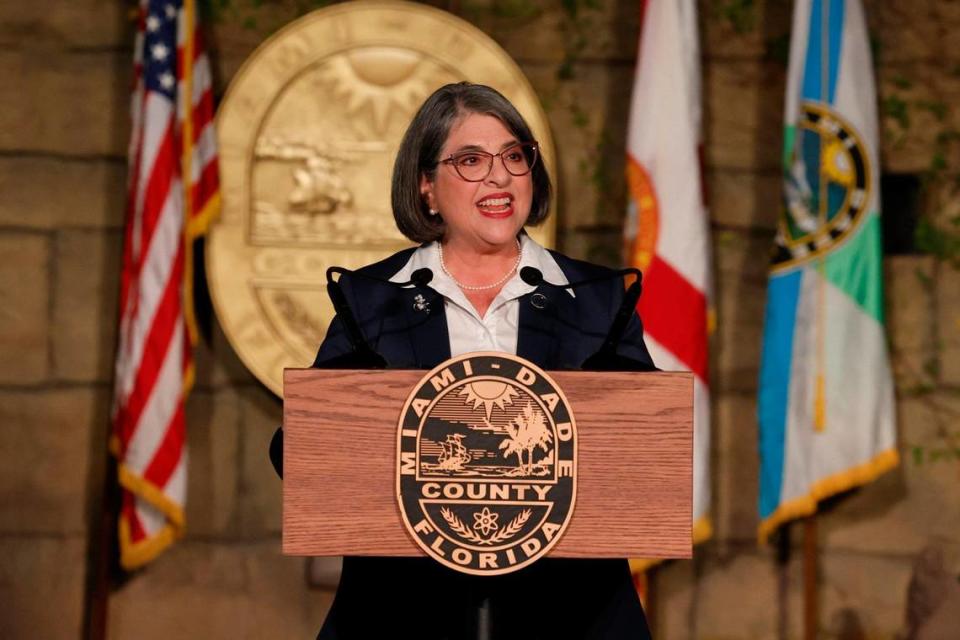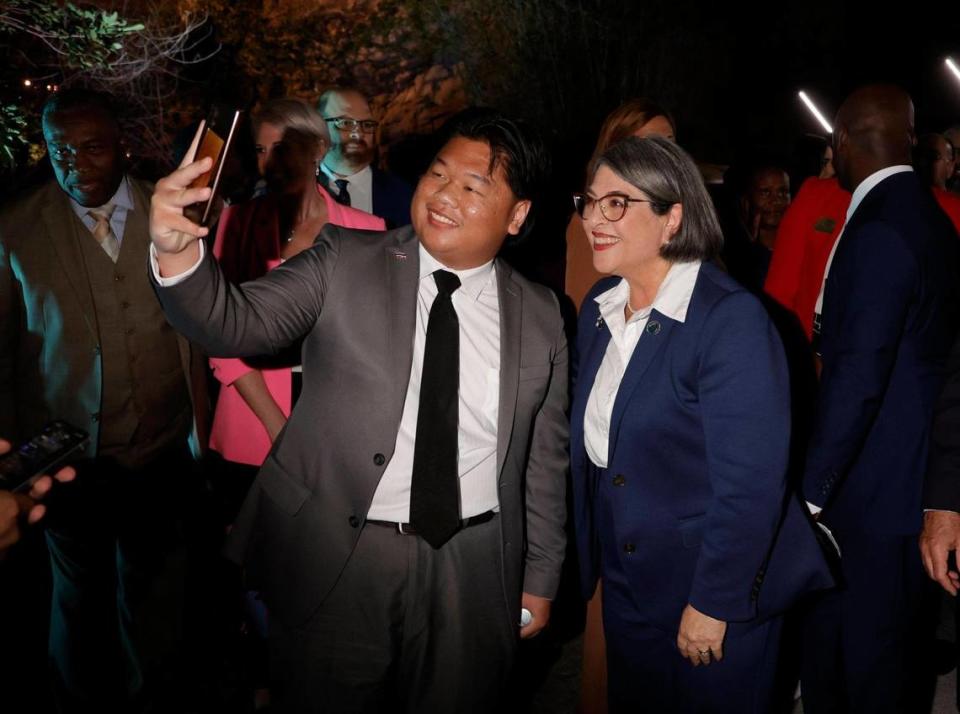Miami-Dade mayor wants county voters to approve $2.5B borrowing plan in November
- Oops!Something went wrong.Please try again later.
Miami-Dade Mayor Daniella Levine Cava said Wednesday night that she would ask voters to approve a $2.5 billion borrowing plan tied to property taxes to fund sewer extensions, affordable housing and other long-term government projects.
In her final State of the County address of her first term, the mayor linked the bond referendum to the speech’s theme of boldness.
“We must be braver and bolder than ever,” Levine Cava said in a speech she delivered at Zoo Miami before an audience of about 1,000 people. “I have never stuck to the status quo. And neither have the people of Miami-Dade.”
The announcement of a proposed “305 Future Ready” bond referendum thrusts Levine Cava into the sensitive issue of higher property taxes as the Democrat prepares to face voters in a non-partisan mayoral election in August.
Miami-Dade would pay back the borrowed $2.5 billion with an existing property tax that already pays down county debt. In passing the referendum, voters would authorize the tax rate to grow as Miami-Dade gradually borrows the $2.5 billion over multiple decades by selling bonds on Wall Street. Buyers of the bonds collect interest payments from the county, and those payments are generated through property taxes.

READ MORE: Levine Cava launches reelection. Can she keep Miami-Dade blue in ’24 after DeSantis win?
The mayor did not go into detail about the potential impact on tax bills or the projects she wants included in the $2.5 billion spending plan, which must first be approved by a vote of the County Commission.
Multiple commissioners on Thursday said they were surprised they had to learn about the borrowing plan while sitting in the audience watching Levine Cava’s speech.
That includes the most powerful commissioner, Chairman Oliver Gilbert, who controls what gets on the board’s agenda. He declined an interview request but confirmed he wasn’t briefed about the plan in advance.
By the end of the day Thursday, commissioners said the administration still hadn’t shared details about the proposal.
“If there is a plan, I haven’t seen it,” said Commissioner Eileen Higgins, a top ally of Levine Cava. Higgins said she wasn’t ready to say whether the Levine Cava proposal made sense but questioned why Miami-Dade would spend big without including the county’s transit system.
“What shocked me is that the word transportation was not mentioned as critical infrastructure,” she said.
Currently, the existing debt tax costs Miami-Dade homeowners about $44 for every $100,000 of their property’s taxable value, down from $49 last year.
If voters approve borrowing another $2.5 billion, will their tax bills go up?
That depends, in part, on how quickly the county decides to actually borrow the money in later years, as well as what happens to Miami-Dade’s real estate market.
This year, the debt tax will cover about $180 million in bond payments on debt topping $2.3 billion.
Most of that —about $1.5 billion — is still tied to the 2004 Building Better Communities referendum, with another $645 million linked to a hospital bond package that voters approved in 2013.
Even with billions still owed, the bond payments on existing debt aren’t projected to increase much. The county’s debt schedule shows debt payments rising a modest 2% over the next decade before starting to drop. Without more borrowing, homeowners would see their debt tax bills drop, too.
New borrowing from the Levine Cava proposal would halt that decline by increasing what Miami-Dade owes bondholders. If real estate values don’t increase quickly enough to cover the county’s higher debt expenses, taxpayers would see their bills grow, too.
The tax rate fluctuates as annual debt obligations ebb and flow. In 2022, it hit a recent peak of $50 per $100,000 of taxable value and now is slightly lower than it was a decade ago, according to county data.
Danielle Cohen Higgins, the county commissioner who Levine Cava said would sponsor the bond legislation, said the county would invest in parks and infrastructure and projects focused on resiliency to climate change.

While Manny Cid, one of Levine Cava’s Republican challengers, said after the speech that he opposed the plan, Levine Cava’s campaign sees it as a popular proposal in her reelection year. The mayor’s political operation polled the potential bond package months before the speech, according to a memo from polling firm EMC Research released Wednesday night by Levine Cava’s campaign director, Christian Ulvert.
The results showed that 79% of respondents supported a $2.5 billion bond package for affordable housing, parks, infrastructure and environmental resilience in a survey of 500 likely voters in mid-November.
The poll language in the memo did not mention property taxes or ask whether voters would accept higher taxes to fund the projects.
Levine Cava mentioned in her State of the County address that Miami-Dade now has the lowest property-tax rate it has had in 40 years, even after her last two budgets included 1% rate cuts. Those cuts still led to higher property taxes as inflation surged.
Miami-Dade voters tend to approve bond referendums. The county last passed one in 2004, when voters approved a $2.9 billion “Building Better Communities” borrowing package that pumped dollars into the PortMiami Tunnel, the Frost science museum, the Miami Beach Convention Center, bridge repairs, health facilities and dozens of other projects.
The Levine Cava proposal is smaller by comparison, with the $2.9 billion borrowing total in 2004 translating to $5.3 billion in inflation-adjusted dollars in 2024. But smaller amounts don’t guarantee success. Miami-Dade voters in 2014 rejected a $390 million bond package to fund the new downtown Miami courthouse, which county commissioners later funded with other sources of revenue.

Cid, the Republican mayor of Miami Lakes and one of Levine Cava’s challengers, told the Miami Herald he opposed the bond proposal and wanted to lower taxes if elected. “Tonight’s State of the County address is yet another example of the dismissive attitude that the current administration has towards working families and small businesses,” he said.
Another Republican challenger, YouTube host Alex Otaola, released a statement criticizing Levine Cava’s speech without mentioning the ballot item. “Miami-Dade deserves honest, transparent and accountable leadership,” he said.
Levine Cava could find herself on the same ballot as the referendum later this year. If no mayoral candidate receives more than 50% of the August vote, the top two finishers will compete in a November run-off.
The mayor said Miami-Dade needs to continue pursuing progress as she seeks another four years managing a government with a budget topping $11 billion.
“We’re in it for the long haul together,” she said. “We’re building for today and investing in tomorrow.”
This article was updated with the correct current rate for the Miami-Dade property tax that funds debt payments.

